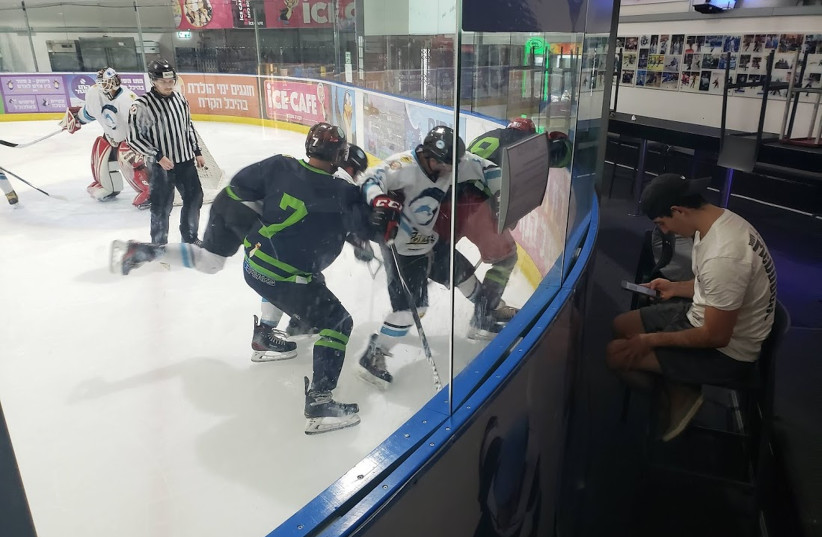The Capitals of Jerusalem sealed a dominant 6-1 victory over the Herzliya Pioneers last week in the opening game of the Israel Elite Hockey League’s third season.
“They destroyed the Pioneers!” said Asher Gold, a Capitals fan after the game. “Everyone in my section was hugging each other and giving high fives, it was like I [had known] these people my whole life,” exclaimed Gold.
For Tal Avneri, who co-founded the Elite Hockey League along with Marc Brunengraber, the fact that there was a strong opening to a third season, along with the victory itself, was the most thrilling part of the night.
“I believe that this is a testament to Israeli hockey, The players are the bloodline of the hockey league and all Israeli hockey,” said Avneri who plays on the Capitas.
His love for the game started as a young kid playing street hockey with his neighbors in Dallas, Texas. Street hockey progressed to hitting the puck on rollerblades, which he then dropped for actual ice skates.

During his gap year in Israel at 19 in 2004, Avneri discovered that his love of Israel didn’t mean he had to give up the winter sport given that since 1991 there has been an ice hockey league in Israel.
He would hitchhike from his program in Tiberias to the large ice rink in Metula on the northern border so he could practice with the team.
He made fast friends with the players that used that rink to practice while in Israel and formally joined the Ice Hockey Federation of Israel. But while the move put a Jewish star on his jersey, it kept him out of the country. Most players in the federation have to live abroad even when they play for Israel. In his case, that meant he spent a lot of time in Finland.
Avineri wanted to both live in Israel and play hockey in Israel
“The best Israeli players didn’t have anyone to play with or against during the year. They all had to leave and spend a ton of money to play outside of Israel and when they come back, they have nothing to do in the summer” Avneri explained.
“With them leaving Israel all year, it just brings down [the level of] Israeli hockey, you know. We should all be playing together, not spread out all over the world. This [Israel Elite Hockey League] is a way to bring everyone together”
In 2020, Avneri left the Federation and created the Israel Elite Hockey League so he could live and play in Israel, a move that was formalized by his making Aliya that same year. The IEHL is a private, semi-professional league. In past seasons, players have received compensation while this year details are still being worked out.
On Wednesday night, in a testament to his success, hockey enthusiasts from all over Israel filled the stands of the small OneIce Arena in Tnuvot – a moshav outside of Netanya – to watch him and the other players beat their sticks on the ice.
Sarah Rabin, an Israeli hockey fan and intern for IEHL, said that unlike American private hockey leagues, the IEHL is a tight-knit community. This creates an intimate and personal connection to the game, which Rabin explained is the goal of the new league.
“You have people from nine different countries, really all over the world, coming to play because they just want to play. It’s a very close community and that is the kind of environment that Israel provides.”
“All the players know each other from each team and they are all living together,” added Rabin, who is a student at New York University studying sports management.
As the league marks its third year, attendance to the games has doubled, reaching almost 1,000 people in the stands, Aveneri said. On Wednesday night, the Pioneer fans were particularly loud at the start of the game, jumping and shouting when their team appeared to take the lead early.
Sol Feder, an American hockey player from Boston who has played hockey since age three, joined the Pioneers this year after playing in Israel for the Jerusalem Bears last year while studying in yeshiva.
“I didn’t just join because it is a good league, but I joined because I get to play hockey in Israel.
“When I got on the rink, I stood on the ice with my yarmulke and sang Hatikvah. I’ve never gotten to do that anywhere else. There is a greater connection to the sport and to your team when playing in Israel.”
